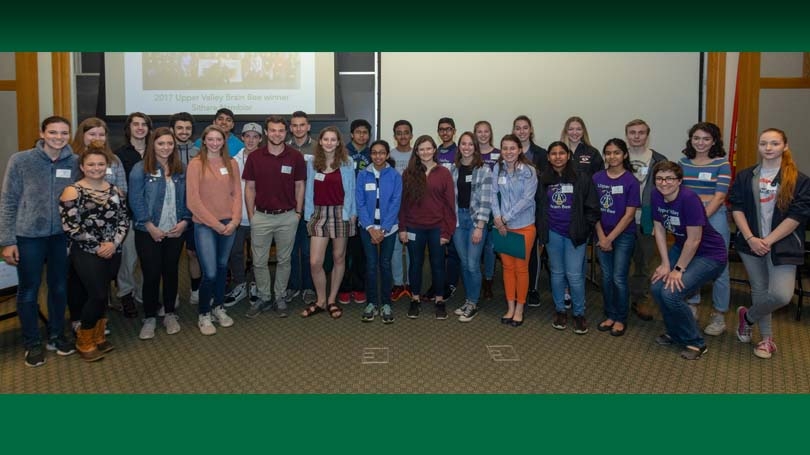
Contestants and volunteers gather at the 2018 Upper Valley Brain Bee, hosted at Dartmouth this spring.
Silence falls across the auditorium. “Would you repeat the question please?” asks 15-year-old Sanjana Kunnikuru, peering up at the panel of three judges sitting at the front of the room. She stands side-by-side with the top five competitors at the Upper Valley Brain Bee, finalists in the day-long neuroscience competition. “Absolutely. It’s a tough one,” says Matthew Havrda, Assistant Professor of Molecular and Systems Biology at Dartmouth. “Name one brain area that is thought to mediate addiction in response to all drugs of abuse.” Sanjana lowers her head, closes her eyes, and takes in a deep, long breath.
“Ventral tegmental area?”
A pause.
“That is… correct!”
It was with this answer that Sanjana won the 6th Annual Upper Valley Brain Bee, after successfully dodging a dozen challenging questions testing her knowledge of neuroscience. Sanjana, a 10th grade student at Bishop Guertin High School in Nashua, New Hampshire, beat out nearly 30 high school competitors in the Brain Bee, earning the opportunity to represent New Hampshire at the 2019 National Brain Bee in Baltimore, MD.
The primary aim of the Upper Valley Brain Bee is to connect students with the field of neuroscience, to inspire them to think about the workings of the brain and to facilitate interest in scientific research. The day began with a neuroscience activities fair for students of all ages and their families, all hosted by undergraduate and graduate students, postdoctoral scholars, and faculty who shared their passion and excitement for neuroscience.
Classic Brain Bee booths include live neuroanatomical dissection of human brains; neurological exams with M.D./Ph.D. students; gustatory, visual, olfactory, and vestibular illusions; and electrical communication demonstrated using invertebrate cockroach nervous systems. A new activity at the fair this year was sheep brain dissections, conducted in tandem with the human brain dissections to highlight the similar and contrasting structures. Another exciting new station connected peripheral physiological measurements with emotional responses mediated in the brain, such as heart rate. Following verbal agreement of participation, students were asked questions that might induce an emotional response (“Are you nervous about competing in the Bee today?”, or “Did you remember to do your chores this morning?”) and measured changes in their physiology. This helped students connect how the brain mediates behavioral or functional changes in the body, and highlighted how these measurements might be applied in scientific research.
In the afternoon, twenty-seven students competed in the Brain Bee, putting their knowledge of brain facts, neuroanatomy, and brain disorders to the test. High schools from across Vermont and New Hampshire were represented at the Bee, including Concord HS, Academy for Science and Design, Woodstock Union HS, Rutland HS, Londonderry HS, Acton-Boxborough Regional HS, Phillips Exeter Academy, and many others.
“I am so impressed with how bright the students are,” says Emily Sullivan, a graduate student and one of the Coordinators of this year’s competition. “I think that the Bee gives students throughout Vermont and New Hampshire the opportunity to explore and learn about the exciting field of neuroscience, an opportunity that they might not have had otherwise. I hope that by participating in the Bee, students will be inspired to pursue this rapidly growing area of science.”
The event culminates in a special keynote lecture, this year delivered by Arti Gaur, Ph.D., an Assistant Professor of Neurology at Geisel School of Medicine at Dartmouth; she shared her journey as a neuroscientist, and her research involving microRNAs as biomarkers for brain tumor development.
The Upper Valley Brain Bee is truly a grassroots event, organized by graduate students and hosted by generously volunteering undergraduate and graduate students, postdoctoral scholars, and faculty. It is supported entirely by generous contributions by the neuroscience community at Dartmouth, including the Neuroscience Center at Dartmouth College, the EPSCoR Attention Consortium, the Institute of Biomolecular Targeting, and a host of Dartmouth-affiliated departments: Medical Education, Molecular and Systems Biology, Neurology, Psychiatry, and Psychological and Brain Sciences. Information about next year’s competition will be posted on the Upper Valley Brain Bee website in January 2019